Shiva Prayer
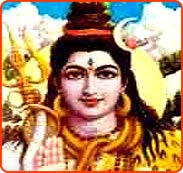 For the devotees of Lord Shiva here is a collection of Lord Shiva Prayers with meaning! Devotees seeking blessings of Lord Shiva must recite Shiv Prarthana with sincerity and faith.
For the devotees of Lord Shiva here is a collection of Lord Shiva Prayers with meaning! Devotees seeking blessings of Lord Shiva must recite Shiv Prarthana with sincerity and faith.
Lord Shiva Prayer - I
Om Sarva Mangal Manglaye Shivay Sarvaarth Sadhike
Sharanye Trayambake Gauri Narayaani Namostu Te
Meaning:
Oh the divine couple Shiva Parvati !
O ! Thee, the protectors of this universe,
Along with Lords Brahma and Vishnu
We pray to You for our well-being, prosperity and the enlightenment of our souls.
Lord Shiva Prayer - II
This mantra is a prayer to Lord Shiva who is addressed as Sankara and Trayambaka. Sankara means giver of blessings: (sana = blessings, Kara = the Giver). Trayambaka is the three eyed one, where the third eye signifies the giver of knowledge, which destroys ignorance and releases us from the cycle of death and rebirth.
Om Namastestu Bhagavan
Visvesaraya Mahadevaya
Trayambakaya Tripurantakaya
Trikagni - Kalaya
Kalagni - Rudraya Nil - Kanthaya Mrityunjaya
Sarvesvaraya Sadadhivaya
Sriman Mahadevaya Namah.
Meaning:
Om. I bow down to Lord Shiva, who is the creator and protector of the universe, who is the greatest among Gods, who has three eyes, who is the annihilator of all the three worlds, one whose throat is blue, who is the conqueror of death, who is the Lord of all, who is propitious who is possessed of all marks of greatness and who is the greatest among Gods. To him my prostration.
Lord Shiva Prayer - III
Naagendra haaraaya thriloochanaaya bhasmaangadhaaraaya maheshwaraaya
Nityaaya shudhdhaaya digambaraaya tasmai nakaaraaya namahshivaaya
Meaning:
Salutations to Shiva who wears a serpent as garland, who is three-eyed, whose bare body is covered with ashes, who is forever pure and the very embodiment of sacrifice.
Shiva Dhun
Shivo Bhokta, Shiva Bhojya
Shivo Karta, Shivah Karma
Shivah Karanatmakah
Meaning:
Shiva is the experiencer and the highest object of experience. Shiva is the goal of Sadhana. There is nothing apart from Shiva. There is nothing other than Shiva. Whatever there is, is Shiva. There is nothing, which is not Shiva. There is no place, which is not Shiva. There is no time, which is not Shiva. To be aware of this is to be aware of Shiva.
Different Names of Lord Shiva
One of the most important Hindu deities, Lord Shiva is known by several names. The Shiva Purana list 1008 names for Lord Shiva. Each of these names in Sanskrit signifies certain attribute of the Lord. Given here are 108 names of Lord Shiva with their meaning.
| 108 Names of Lord Shiva |
| S No | Lord Shiva Name | Meaning |
| 1 | Aashutosh | One who fulfills wishes instantly |
| 2 | Aja | Unborn |
| 3 | Akshayaguna | God with limitless attributes |
| 4 | Anagha | Without any fault |
| 5 | Anantadrishti | Of infinite vision |
| 6 | Augadh | One who revels all the time |
| 7 | Avyayaprabhu | Imperishable Lord |
| 8 | Bhairav | Lord of terror |
| 9 | Bhalanetra | One who has an eye in the forehead |
| 10 | Bholenath | Kind hearted Lord |
| 11 | Bhooteshwara | Lord of ghosts and evil beings |
| 12 | Bhudeva | Lord of the earth |
| 13 | Bhutapala | Protector of the ghosts |
| 14 | Chandrapal | Master of the moon |
| 15 | Chandraprakash | One who has moon as a crest |
| 16 | Dayalu | Compassionate |
| 17 | Devadeva | Lord of the Lords |
| 18 | Dhanadeepa | Lord of Wealth |
| 19 | Dhyanadeep | Icon of meditation and concentration |
| 20 | Dhyutidhara | Lord of Brilliance |
| 21 | Digambara | One who has the skies as his clothes |
| 22 | Durjaneeya | Difficult to be known |
| 23 | Durjaya | Unvanquished |
| 24 | Gangadhara | Lord of River Ganga |
| 25 | Girijapati | Consort of Girija |
| 26 | Gunagrahin | Acceptor of Gunas |
| 27 | Gurudeva | Master of All |
| 28 | Hara | Remover of Sins |
| 29 | Jagadisha | Master of the Universe |
| 30 | Jaradhishamana | Redeemer from Afflictions |
| 31 | Jatin | One who has matted hair |
| 32 | Kailas | One Who Bestows Peace |
| 33 | Kailashadhipati | Lord of Mount Kailash |
| 34 | Kailashnath | Master of Mount Kailash |
| 35 | Kamalakshana | Lotus-eyed Lord |
| 36 | Kantha | Ever-Radiant |
| 37 | Kapalin | One who wears a necklace of skulls |
| 38 | Khatvangin | One who has the missile khatvangin in his hand |
| 39 | Kundalin | One who wears earrings |
| 40 | Lalataksha | One who has an eye in the forehead |
| 41 | Lingadhyaksha | Lord of the Lingas |
| 42 | Lingaraja | Lord of the Lingas |
| 43 | Lokankara | Creator of the Three Worlds |
| 44 | Lokapal | One who takes care of the world |
| 45 | Mahabuddhi | Extremely intelligent |
| 46 | Mahadeva | Greatest God |
| 47 | Mahakala | Lord of All Times |
| 48 | Mahamaya | Of great illusions |
| 49 | Mahamrityunjaya | Great victor of death |
| 50 | Mahanidhi | Great storehouse |
| 51 | Mahashaktimaya | One who has boundless energies |
| 52 | Mahayogi | Greatest of all Gods |
| 53 | Mahesha | Supreme Lord |
| 54 | Maheshwara | Lord of Gods |
| 55 | Nagabhushana | One who has serpents as ornaments |
| 56 | Nataraja | King of the art of dancing |
| 57 | Nilakantha | The one with a blue throat |
| 58 | Nityasundara | Ever beautiful |
| 59 | Nrityapriya | Lover of Dance |
| 60 | Omkara | Creator of OM |
| 61 | Palanhaar | One who protects everyone |
| 62 | Parameshwara First among all gods | First among all gods |
| 63 | Paramjyoti | Greatest splendor |
| 64 | Pashupati | Lord of all living beings |
| 65 | Pinakin | One who has a bow in his hand |
| 66 | Pranava | Originator of the syllable of OM |
| 67 | Priyabhakta | Favorite of the devotees |
| 68 | Priyadarshana | Of loving vision |
| 69 | Pushkara | One who gives nourishment |
| 70 | Pushpalochana | One who has eyes like flowers |
| 71 | Ravilochana | Having sun as the eye |
| 72 | Rudra | The terrible |
| 73 | Rudraksha | One who has eyes like Rudra |
| 74 | Sadashiva | Eternal God |
| 75 | Sanatana | Eternal Lord |
| 76 | Sarvacharya | Preceptor of All |
| 77 | Sarvashiva | Always Pure |
| 78 | Sarvatapana | Scorcher of All |
| 79 | Sarvayoni | Source of Everything |
| 80 | Sarveshwara | Lord of All Gods |
| 81 | Shambhu | Abode of Joy |
| 82 | Shankara | Giver of Joy |
| 83 | Shiva | Always Pure |
| 84 | Shoolin | One who has a trident |
| 85 | Shrikantha | Of glorious neck |
| 86 | Shrutiprakasha | Illuminator of the Vedas |
| 87 | Shuddhavigraha | One who has a pure body |
| 88 | Skandaguru | Preceptor of Skanda |
| 89 | Someshwara | Lord of All Gods |
| 90 | Sukhada | Bestower of happiness |
| 91 | Suprita | Well pleased |
| 92 | Suragana | Having Gods as attendants |
| 93 | Sureshwara | Lord of All Gods |
| 94 | Swayambhu | Self-Manifested |
| 95 | Tejaswani | One who spreads illumination |
| 96 | Trilochana | Three-Eyed Lord |
| 97 | Trilokpati | Master of all the Three Worlds |
| 98 | Tripurari | Enemy of Tripura |
| 99 | Trishoolin | One who has a trident in his hands |
| 100 | Umapati | Consort of Uma |
| 101 | Vachaspati | Lord of Speech |
| 102 | Vajrahasta | One who has a thunderbolt in his hands |
| 103 | Varada | Granter of Boons |
| 104 | Vedakarta | Originator of the Vedas |
| 105 | Veerabhadra | Supreme Lord of the Nether World |
| 106 | Vishalaksha | Wide-eyed Lord |
| 107 | Vishveshwara | Lord of the Universe |
| 108 | Vrishavahana | One who has bull as his vehicle |
Mahashivaratri Festival
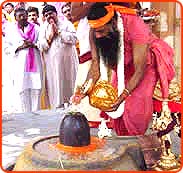 Mahashivaratri Festival or the 'The Night of Shiva' is celebrated with devotion and religious fervor in honor of Lord Shiva, one of the deities of Hindu Trinity. Shivaratri falls on the moonless 14th night of the new moon in the Hindu month of Phalgun, which corresponds to the month of February - March in English Calendar. Celebrating the festival of Shivaratri devotees observe day and night fast and perform ritual worship of Shiva Lingam to appease Lord Shiva.
Mahashivaratri Festival or the 'The Night of Shiva' is celebrated with devotion and religious fervor in honor of Lord Shiva, one of the deities of Hindu Trinity. Shivaratri falls on the moonless 14th night of the new moon in the Hindu month of Phalgun, which corresponds to the month of February - March in English Calendar. Celebrating the festival of Shivaratri devotees observe day and night fast and perform ritual worship of Shiva Lingam to appease Lord Shiva.
Legends of Mahashivratri
There are various interesting legends related to the festival of Maha Shivaratri. According to one of the most popular legends, Shivaratri marks the wedding day of Lord Shiva and Parvati. Some believe that it was on the auspicious night of Shivaratri that Lord Shiva performed the 'Tandava', the dance of the primal creation, preservation and destruction. Another popular Shivratri legend stated in Linga Purana states that it was on Shivaratri that Lord Shiva manifested himself in the form of a Linga. Hence the day is considered to be extremely auspicious by Shiva devotees and they celebrate it as Mahashivaratri - the grand night of Shiva.
Traditions and Customs of Shivaratri
Various traditions and customs related to Shivaratri Festival are dutifully followed by the worshippers of Lord Shiva. Devotees observe strict fast in honor of Shiva, though many go on a diet of fruits and milk some do not consume even a drop of water. Devotees strongly believe that sincere worship of Lord Shiva on the auspicious day of Shivaratri, absolves a person of sins and liberates him from the cycle of birth and death. Shivaratri is considered especially auspicious for women. While married women pray for the well being of their husbands unmarried women pray for a husband like Lord Shiva, who is regarded as the ideal husband.
To mark the Shivratri festival, devotees wake up early and take a ritual bath, preferably in river Ganga. After wearing fresh new clothes devotees visit the nearest Shiva temple to give ritual bath to the Shiva Lingum with milk, honey, water etc.
On Shivaratri, worship of Lord Shiva continues all through the day and night. Every three hours priests perform ritual pooja of Shivalingam by bathing it with milk, yoghurt, honey, ghee, sugar and water amidst the chanting of "Om Namah Shivaya' and ringing of temple bells. Nightlong vigil or jaagran is also observed in Shiva temples where large number of devotees spend the night singing hymns and devotional songs in praise of Lord Shiva. It is only on the following morning that devotee break their fast by partaking prasad offered to the deity.
When is Shivaratri?
Shivaratri 2010 is on February 12, Friday
 Auspicious festival of Mahashivaratri falls on the 13th or the 14th night of the new moon during Krishna Paksha in the Hindu month of Phalgun. The Sanskrit term, Krishna Paksha means the period of waning moon or the dark fortnight and Phalguna corresponds to the month of February - March in English Calendar. Shivaratri Festival is celebrated on a moonless night.
Auspicious festival of Mahashivaratri falls on the 13th or the 14th night of the new moon during Krishna Paksha in the Hindu month of Phalgun. The Sanskrit term, Krishna Paksha means the period of waning moon or the dark fortnight and Phalguna corresponds to the month of February - March in English Calendar. Shivaratri Festival is celebrated on a moonless night.
According to Hindu mythology, Shivaratri or 'Shiva's Great Night' symbolizes the wedding day of Lord Shiva and Parvati. Many however, believe, Shivaratri is the night when Lord Shiva performed the Tandava Nritya - the dance of primordial creation, preservation and destruction. Celebrating the festival in a customary manner, devotees give a ritual bath to the Lingam with the panchagavya - milk, sour milk, urine, butter and dung. Celebrations of Shivaratri Festival mainly take place at night. Devotees of Lord Shiva throng Shiva temples across the country and spend 'the Night of Lord Shiva' by chanting verses and hymns in praise of the Lord. The festival holds special meaning for the ladies. They pray to Goddess Parvati also called 'Gaura', the giver of 'suhag' for good husbands, marital bliss and a long and prosperous married life.
Shivaratri Rituals
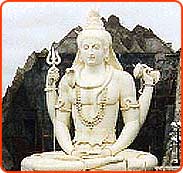 Devotees of Lord Shiva observe the Shivaratri Festival by following the prescribed rituals with sincerity and devotion. All through the day, devotees abstain from eating food and break their fast only the next morning, after the nightlong worship. Ritual baths of Shivalinga in the numerous Shiva temples by Shiva worshipper, mainly women, is another significant feature of Shivratri customs and traditions. Devotees strongly believe that ritual worship of Lord Shiva on the auspicious day of Shivaratri absolves them of past sins and they are blessed with Moksha.
Devotees of Lord Shiva observe the Shivaratri Festival by following the prescribed rituals with sincerity and devotion. All through the day, devotees abstain from eating food and break their fast only the next morning, after the nightlong worship. Ritual baths of Shivalinga in the numerous Shiva temples by Shiva worshipper, mainly women, is another significant feature of Shivratri customs and traditions. Devotees strongly believe that ritual worship of Lord Shiva on the auspicious day of Shivaratri absolves them of past sins and they are blessed with Moksha.
Rituals Observed on a Shivaratri Morning
As a tradition devotees wake up early in the morning of the Mahashivratri day and take a ritual sunrise bath, preferably in the holy waters of river Ganga. They also offer prayers to the Sun God, Vishnu and Shiva as a part of a purification rite observed on all-important Hindu festivals. After wearing fresh new clothes devotees visit the nearest Shiva Temple to give the customary bath to the Shivalinga.
On a Shivratri day, Shiva temples are thronged by devotees, mainly women, who come to perform the traditional Shivalinga pooja and seek blessings from the god. At times there is so much rush in the temples that devotees have to wait for their turn to observe pooja. At their turn for worship, devotees circumambulate the Shivalinga, three or seven times, and then pour water over it. Some also pour milk. Sounds of bell and shouts of 'Shankarji ki Jai' or (Hail Shiva) reverberate in the temple premises.
Ritual Bath of Shivalinga
Following the rituals prescribed in the Shiva Purana, every three hours, Shivalingam is given a special bath with milk, yoghurt, honey, sandalwood paste and rose water. Puja, meditation and chanting of 'Om Namah Shivaya' accompany the ritual bath. Following the bath, vermilion paste is applied on the linga. Traditionally, leaves of a forest tree Aegle marmelos (bilwa, maredu, wood apple) are used for Shiva puja. Thereafter, Bilwa leaves, which have to be a stalk with three leaves, is kept on top of the Shivalinga. Ber or jujube fruit is a special offering to the god on this day. Beetle leaves are also offered by some. Some also offer bilwa leaves in the belief that the Goddess Lakshmi resides in them. Others believe it is offered for its cooling effects on the hot-tempered deity. Many devotees also decorate the linga with flowers and garlands and offer incense sticks and fruit.
Significance of Puja Items
- According to the Shiva Purana, there is a special significance of the six essential puja items used in the Shiva worship.
- Bathing of Shivalinga with water, milk and honey and wood apple or bel leaves added to it, represents purification of the soul.
- The vermilion paste applied on the linga after the ritual bath represents virtue.
- Offering of fruits symbolizes longevity and gratification of desires.
- Burning of incense sticks yields wealth.
- The lighting of the lamp symbolizes attainment of knowledge.
- Offering of betel leaves marks satisfaction with worldly pleasures.
All-Night Shiva Worship
Worship of Lord Shiva continues all through the night on Shivaratri Festival. Devotees stay awake all night and spend the night in Shiva temples in worship of Lord Shiva. Singing of hymns and verses in praise and devotion of Lord Shiva besides the intense chanting of Om Namah Shivay, the mantra that is said free people from all their sins, continue through the night on Shivaratri.
Special worship of Shiva by priests continues through the nightlong prayer vigil. During this ritual worship, Lord Shiva is offered special food made from the fruits of the season, root vegetables and coconuts. Those observing the Shivaratri Fast break their fast the next morning by consuming the prasad offered to Shiva.
Shivaratri Celebrations
 Shivaratri Celebrations in India are marked with devotion and religious fervor. Joy is writ large on the faces of millions of Lord Shiva devotees as they start preparing for the biggest Lord Shiva festival in advance. Celebrations of Shivaratri began with the break of the dawn on the Shivratri day and continue all though the night. Devotees observe fast and spend the day in devotion and worship of Lord Shiva. Many worshippers also participate in the jaagran or the night vigil organized in various Shiva temples across the country. Devotees believe that sincere observance of Shivaratri puja and all night worship of Lord Shiva will absolve them of all their sins and liberate them from the cycle of birth and death.
Shivaratri Celebrations in India are marked with devotion and religious fervor. Joy is writ large on the faces of millions of Lord Shiva devotees as they start preparing for the biggest Lord Shiva festival in advance. Celebrations of Shivaratri began with the break of the dawn on the Shivratri day and continue all though the night. Devotees observe fast and spend the day in devotion and worship of Lord Shiva. Many worshippers also participate in the jaagran or the night vigil organized in various Shiva temples across the country. Devotees believe that sincere observance of Shivaratri puja and all night worship of Lord Shiva will absolve them of all their sins and liberate them from the cycle of birth and death.
Shivaratri Celebrations in Temples
After the ritual bath, preferably in the sacred waters of river Ganga, devotees pay a visit to the nearest Lord Shiva temple carrying the traditional puja items like milk, water, bel leaves, fruits, incense stick, oil lamp etc. Due to massive popularity of the festival several stalls selling puja items come up outside the temple and do a thriving business.
In the bigger and more popular Shiva temples there is massive rush of devotees. Long queues can be noticed as devotees, mostly women, wait for their turn to perform puja. Since, bathing of Shiva Linga with milk is part of the Shivaratri Puja tradition; little rivers are formed due to the excessively overflowing milk and fruit in the Shiva temples on this day.
Ritual worship of Shiva Linga is done by temple priests every three hours all through the day and night of Shivaratri Festival. Shouts of 'Shivaji ki Jai', chanting of the mantra, 'Om Namah Shivaya' and ringing of temple bells make the atmosphere religious and devotional.
Nightlong vigil on Shivratri or the Jaagran is celebrated by singing of devotional hymns and songs in worship of Lord Shiva. And, it is only in the following morning that the devotees break their fast by consuming prasad offered to the Lord.
Shivaratri Celebrations by Women
Shivratri Festival is particularly awaited by Hindu women. On Shivaratri, married and unmarried women perform puja with great faith, as Goddess Parvati who is also called 'Gaura', is regarded as the giver of 'suhag' - good husbands, marital bliss and a long and prosperous married life. One can therefore see find women enthusiastically observing the fast and performing the rituals Shiva Pujas on the day.
Tradition of Drinking Thandai
Since Lord Shiva is regarded as an ascetic god, Maha Shivratri is very popular with ascetics. Thandai, a drink made with bhang (cannabis), almonds, and milk, is essentially drunk by the devout on the day as cannabis is said to have been very dear to Shiva.
Shivaratri Fast
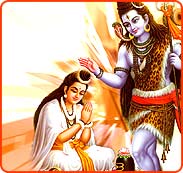 Shivaratri Fast is considered to be the most important fast for the devotees of Lord Shiva. Shiva Purana goes on to say that if a devotee observes Shivaratri Vrata with sincerity, pure devotion and love he is blessed with the divine grace of Lord Shiva. Every year devotees observe Maha Shivaratri fast with devotion and sincerity. Though many go on a diet of fruits and milk, some do not consume even a drop of water all through the day and night of Shivaratri Festival.
Shivaratri Fast is considered to be the most important fast for the devotees of Lord Shiva. Shiva Purana goes on to say that if a devotee observes Shivaratri Vrata with sincerity, pure devotion and love he is blessed with the divine grace of Lord Shiva. Every year devotees observe Maha Shivaratri fast with devotion and sincerity. Though many go on a diet of fruits and milk, some do not consume even a drop of water all through the day and night of Shivaratri Festival.
Merits of Mahashivratri Vrat
According to Hindu mythology, observance of mahashivratri Vrat with discipline helps a devotee to control the two great natural forces that afflict a man, rajas guna (the quality of passionate activity) and tamas guna (the quality of inertia). When a devotee spends an entire day in the Feet of Lord and worships with sincerity, his motion is controlled and evils like lust, anger and jealousy, born of Rajas are ignored and subdued. Besides, when a devotee observes vigil throughout the night (jaagran) he manages to conquer the evils of Tamas Guna too. It has also been mentioned that when a devotee observes a round of worship every three hours, the Shivaratri Vrata becomes perfect.
Devotees of Lord Shiva believe consider Shivratri fast to be extremely auspicious and rate it equal or more than performing an Ashwamedha Yagna. Some believe that a devotee who observes a Shivaratri Fast with sincerity and utters the name of Lord Shiva with perfect devotion is absolved from all sins. Such a devotee reaches the abode of Lord Shiva and lives there happily. He is also liberated from the cycle of birth and death.
Customs and Traditions of Shivaratri Fast
As a tradition, devotees who are on a strict fast on Shivaratri take bath with the water that is boiled with black sesame seeds to wash away bodily impurities. After putting on fresh new clothes, a devotee visit the nearest Lord Shiva temple to perform the ritual Shiva Linga bath with milk, honey etc. While bathing the Lingam a devotee prays, "O Lord ! I will bathe Thee with water, milk, etc. Do Thou kindly bathe me with the milk of wisdom. Do Thou kindly wash me of all my sins, so that the fire of worldliness which is scorching me may be put out once for all, so that I may be one with Thee-the One alone without a second."
Following the sacred bath, devotee applies haldi-kumkum on the lingum and place a garland of white and pink lotus flowers on it. Bel leaves are also placed at the top of the Lingum. Aarthi and bhajans in praise of Lord Shiva are also sung to invoke his blessings. Devotee also light incense stick and ring temple bell to invoke the blessing of the large-hearted Lord Shiva.
It may be noted that unlike most other festivals, where after performing the Puja of the deity a feast follows, a Shivratri fast continues all through the day and night. Devotees observe an all night vigil while chanting the mantra, "Om Namah Shivaya" and singing devotional hymns and songs. Even during the night, Shiva Lings is given the holy bath every three hours. An offering of fruits is also made to the deity. There is also the tradition to listen to the recital of various legends and stories related to Shivaratri and Lord Shiva and to understand its deeper meanings. It is only in the following morning that a devotee breaks the fast by consuming the prasad offered to Lord Shankar.
Significance of Shivratri
 Festival of Mahashivaratri is the most important festival for the millions of devotees of Lord Shiva. The festival has been accorded lot of significance in Hindu mythology. It says that a devotee who performs sincere worship of Lord Shiva on the auspicious day of Shivratri is absolved of sins and attains moksha.
Festival of Mahashivaratri is the most important festival for the millions of devotees of Lord Shiva. The festival has been accorded lot of significance in Hindu mythology. It says that a devotee who performs sincere worship of Lord Shiva on the auspicious day of Shivratri is absolved of sins and attains moksha.
Significance of Shivaratri in Hinduism
Festival of Mahashivaratri has tremendous significance in Hinduism. According to sacred scriptures, ritual worship of Lord Shiva on Shivratri festival that falls on the 14th day of the dark fortnight in the month of Phalgun pleases Lord Shiva the most. This fact is said to have been declared by Lord Shiva himself, when his consort Parvati asked him as to which ritual performed by his devotees pleases him the most.
Even till date, devotees of Lord Shiva perform the ritual worship of Shivratri with care and devotion. They observe day and nigh fast and give sacred bath to Shiva Linga with honey, milk, water etc. Hindus consider it extremely auspicious to worship Lord Shiva on a Shivaratri as it is believed that worship of Lord Shiva with devotion and sincerity absolves a devotee of past sins. The devotee reaches the abode of Lord Shanker and lives there happily. He is also liberated from the cycle of birth and death and attains moksha or salvation.
Significance of Shivaratri for Women
Mahashivratri Festival is also considered to be an extremely significant festival by women. Married and unmarried women observe fast and perform Shiva Puja with sincerity to appease Goddess Parvati who is also regarded as 'Gaura' - one who bestows marital bliss and long and prosperous married life. Unmarried women also pray for a husband like Lord Shiva who is regarded as the ideal husband.
Credit Goes To The Link.........................
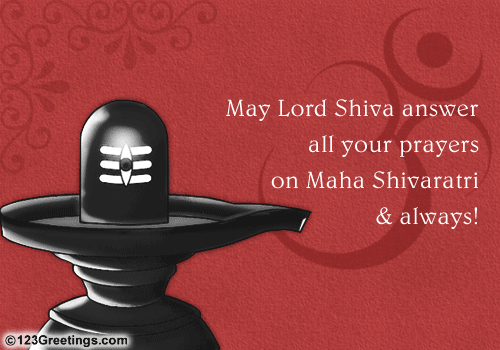





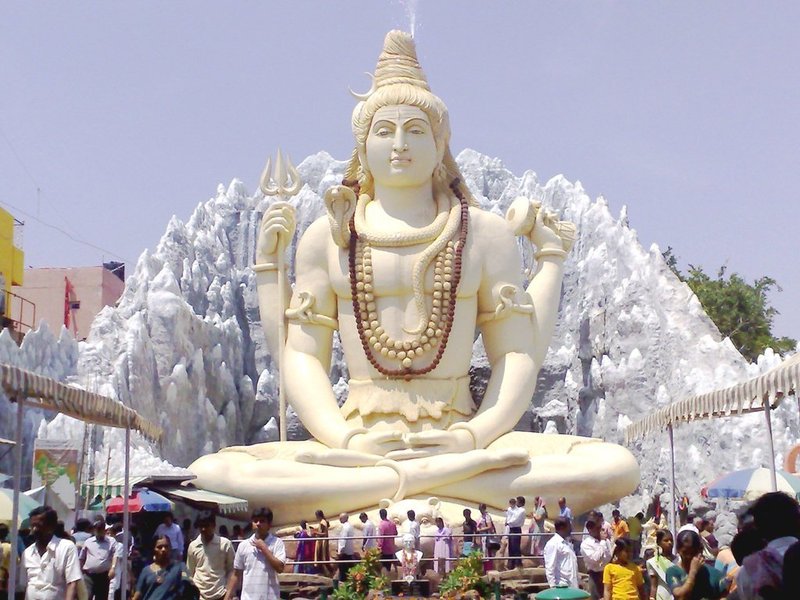
 For the devotees of Lord Shiva here is a collection of Lord Shiva Prayers with meaning! Devotees seeking blessings of Lord Shiva must recite Shiv Prarthana with sincerity and faith.
For the devotees of Lord Shiva here is a collection of Lord Shiva Prayers with meaning! Devotees seeking blessings of Lord Shiva must recite Shiv Prarthana with sincerity and faith.  Mahashivaratri Festival or the 'The Night of Shiva' is celebrated with devotion and religious fervor in honor of Lord Shiva, one of the deities of Hindu Trinity. Shivaratri falls on the moonless 14th night of the new moon in the Hindu month of Phalgun, which corresponds to the month of February - March in English Calendar. Celebrating the festival of Shivaratri devotees observe day and night fast and perform ritual worship of Shiva Lingam to appease Lord Shiva.
Mahashivaratri Festival or the 'The Night of Shiva' is celebrated with devotion and religious fervor in honor of Lord Shiva, one of the deities of Hindu Trinity. Shivaratri falls on the moonless 14th night of the new moon in the Hindu month of Phalgun, which corresponds to the month of February - March in English Calendar. Celebrating the festival of Shivaratri devotees observe day and night fast and perform ritual worship of Shiva Lingam to appease Lord Shiva. Auspicious festival of Mahashivaratri falls on the 13th or the 14th night of the new moon during Krishna Paksha in the Hindu month of Phalgun. The Sanskrit term, Krishna Paksha means the period of waning moon or the dark fortnight and Phalguna corresponds to the month of February - March in English Calendar. Shivaratri Festival is celebrated on a moonless night.
Auspicious festival of Mahashivaratri falls on the 13th or the 14th night of the new moon during Krishna Paksha in the Hindu month of Phalgun. The Sanskrit term, Krishna Paksha means the period of waning moon or the dark fortnight and Phalguna corresponds to the month of February - March in English Calendar. Shivaratri Festival is celebrated on a moonless night. Devotees of Lord Shiva observe the Shivaratri Festival by following the prescribed rituals with sincerity and devotion. All through the day, devotees abstain from eating food and break their fast only the next morning, after the nightlong worship. Ritual baths of Shivalinga in the numerous Shiva temples by Shiva worshipper, mainly women, is another significant feature of Shivratri customs and traditions. Devotees strongly believe that ritual worship of Lord Shiva on the auspicious day of Shivaratri absolves them of past sins and they are blessed with Moksha.
Devotees of Lord Shiva observe the Shivaratri Festival by following the prescribed rituals with sincerity and devotion. All through the day, devotees abstain from eating food and break their fast only the next morning, after the nightlong worship. Ritual baths of Shivalinga in the numerous Shiva temples by Shiva worshipper, mainly women, is another significant feature of Shivratri customs and traditions. Devotees strongly believe that ritual worship of Lord Shiva on the auspicious day of Shivaratri absolves them of past sins and they are blessed with Moksha. Shivaratri Celebrations in India are marked with devotion and religious fervor. Joy is writ large on the faces of millions of Lord Shiva devotees as they start preparing for the biggest Lord Shiva festival in advance. Celebrations of Shivaratri began with the break of the dawn on the Shivratri day and continue all though the night. Devotees observe fast and spend the day in devotion and worship of Lord Shiva. Many worshippers also participate in the jaagran or the night vigil organized in various Shiva temples across the country. Devotees believe that sincere observance of Shivaratri puja and all night worship of Lord Shiva will absolve them of all their sins and liberate them from the cycle of birth and death.
Shivaratri Celebrations in India are marked with devotion and religious fervor. Joy is writ large on the faces of millions of Lord Shiva devotees as they start preparing for the biggest Lord Shiva festival in advance. Celebrations of Shivaratri began with the break of the dawn on the Shivratri day and continue all though the night. Devotees observe fast and spend the day in devotion and worship of Lord Shiva. Many worshippers also participate in the jaagran or the night vigil organized in various Shiva temples across the country. Devotees believe that sincere observance of Shivaratri puja and all night worship of Lord Shiva will absolve them of all their sins and liberate them from the cycle of birth and death. Shivaratri Fast is considered to be the most important fast for the devotees of Lord Shiva. Shiva Purana goes on to say that if a devotee observes Shivaratri Vrata with sincerity, pure devotion and love he is blessed with the divine grace of Lord Shiva. Every year devotees observe Maha Shivaratri fast with devotion and sincerity. Though many go on a diet of fruits and milk, some do not consume even a drop of water all through the day and night of Shivaratri Festival.
Shivaratri Fast is considered to be the most important fast for the devotees of Lord Shiva. Shiva Purana goes on to say that if a devotee observes Shivaratri Vrata with sincerity, pure devotion and love he is blessed with the divine grace of Lord Shiva. Every year devotees observe Maha Shivaratri fast with devotion and sincerity. Though many go on a diet of fruits and milk, some do not consume even a drop of water all through the day and night of Shivaratri Festival. Festival of Mahashivaratri is the most important festival for the millions of devotees of Lord Shiva. The festival has been accorded lot of significance in Hindu mythology. It says that a devotee who performs sincere worship of Lord Shiva on the auspicious day of Shivratri is absolved of sins and attains moksha.
Festival of Mahashivaratri is the most important festival for the millions of devotees of Lord Shiva. The festival has been accorded lot of significance in Hindu mythology. It says that a devotee who performs sincere worship of Lord Shiva on the auspicious day of Shivratri is absolved of sins and attains moksha.